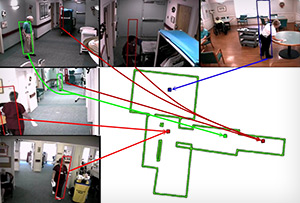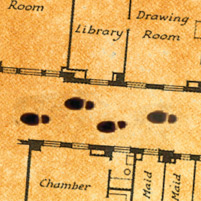Technological Wizardry

Click photo above to view larger image showing a multi-camera tracking system

Carnegie Mellon University's Alexander Hauptmann and his team are celebrating Harry Potter's July 31 birthday in a unique way — with their own version of Harry's magical tracking 'Marauder's Map.' Hoping to detect health problems in elderly patients, they've developed a real-life tracking method for indoor settings.
"Our CareMedia project involves continuously observing nursing home patients to provide early detection of adverse health trends," explained Hauptmann, a principal systems scientist in the School of Computer Science. "We developed our tracking technology in order to better understand each patient's daily activity."
The system uses a network of video cameras. While previous automated techniques focused only on a well-controlled lab environment, Hauptmann's team was successful amid the complex and chaotic nursing home setting, with real-world difficulties including lighting variation, congregating groups and compromised camera views.
The researchers — Hauptmann, Shoou-I Yu, Ph.D. student in the Language Technologies Institute and Yi Yang, computer science post-doctoral researcher — accomplished this feat through the use of mathematical models and multiple video feed cues, including apparel color, person detection, motion trajectories and most important, facial recognition.
While all information was necessary, facial recognition proved of greatest significance. And while the team had tackled this problem before, it was Yu's new insights that enabled success.
The study involved 13 patient participants, all of whom consented to observation.
"At the same time, we are actively investigating methods to use video but still preserve privacy, for example, by recording only outlines combined with distance information," said Hauptmann.
While his work has been focused on the elderly, other potential applications for automated tracking are airports, public facilities and other areas where security is a concern.
Despite the importance of cameras in identifying perpetrators following this spring's Boston Marathon bombing and the 2005 London bombings, much of the necessary video analysis in forensic situations is currently done manually, Hauptmann noted.
Hauptmann arrived at CMU in 1984 to earn his PhD in computer science and has been at the university ever since.
"It was clearly the best school for my degree, especially with my interests in artificial intelligence, language, and speech," he said. "I stayed because the intellectual environment was so much more interesting than all other academic and corporate alternatives."
"CMU, especially the School of Computer Science, is a very open place," he added. "Someone has state-of-the-art expertise in really every area of investigation I have ever been interested in. Nearly everyone is willing to help provide information and even collaborate. With that environment to support you, successfully advancing a research effort is so much easier."
The National Science Foundation sponsored this research.
Related Links: Read press release | CareMedia | School of Computer Science | Language Technologies Institute
